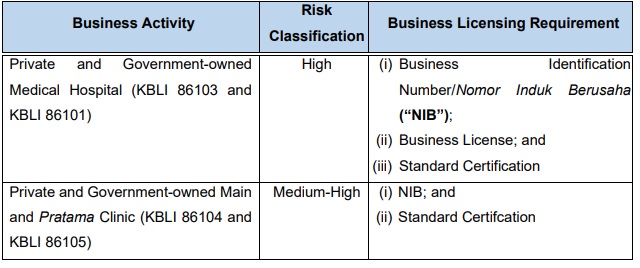In connection with the enactment of Law No. 11 of 2020 on the Job Creation ("Omnibus Law"), the Indonesian Government has issued various implementing regulations as a part of the implementation of the Risk-Based Approach business licensing. As we have mentioned in our earlier articles, the main objective of the amendment is to reorganize and simplify Indonesia's business licensing requirements and procedures. (Note: You can access our previous publications regarding the new investment regime here and here)
This time, for the purpose of this article, we will focus our analysis of this article on the licensing aspects of medical hospital and clinic businesses in Indonesia.
Legal Framework: This executive summary referred to the following prevailing regulations:
- Government Regulation ("GR") No. 5 of 2021 on Implementation of Risk-Based Business Licensing ("GR 5/2021");
- GR No. 47 of 2021 on the Hospital Administration ("GR 47/2021");
- Presidential Regulation No. 10 of 2021 on Investment Business Field, as amended by PR No. 49 of 2021 ("PR 10/2021"); and
- Minister of Health Regulation No. 14 of 2021 on Business Activities and Products Standards on the Organization of Risk-Based Business Licensing within the Health Sector ("MoH Regulation 14/2021").
Risk Classification of Medical Hospitals & Clinics: Below are the risk classification of medical hospitals and clinics activities pursuant to Appendix I of GR 5/2021:

Relaxation on Foreign Ownership Restriction: In the previous regime, private hospital and clinic were subject to maximum of (i) 67% of foreign ownership and, (ii) 70% for ASEAN countries. Under the current regime, such restrictions have been removed by the issuance of PR 10/2021 ("Positive Investment List"), as such, these business activities are now open for 100% for foreign direct investment.
Notwithstanding the Positive Investment List, other form of healthcare facilities that are classified as 'Pratama Clinic' activity (i.e., private maternity home, clinic general medical, general medical clinic, residential health services, and basic health care facilities) remains close for foreign investment and reserved solely for domestic Cooperation and SMEs players.
Classification of Hospital and Inpatient Beds Requirement: Classification of hospital and number of inpatient beds requirements pursuant to Art. 16 of GR 47/2021 are detailed as follows:

Foreign-owned hospitals are subject to a different minimum inpatients bed requirement. The applicable minimum beds requirements for a foreign-owned general and specialty hospital would be as follows:
- general hospital to have minimum 200 inpatient beds; and
- specialty hospital to have minimum 100 inpatient beds (Art. 20 (2) and (3) of GR 47/2021)
Some types of hospitals, however, are exempted from the above requirements. The types of hospital that are eligible for such exemption are: (i) dental hospitals, (ii) ear, nose, and throat hospitals, and (iii) head and neck hospitals.
(Please refer to Art. 17 (2) and (3) of GR 47/2021 for specific requirements that applies to certain types of hospital.)
Additional Mandatory Supporting Services: All types of hospitals (including general and specialty hospitals) are now require to provide the following additional supporting services, these services are previously not mandatory under the previous regulatory regime:

Mandatory Isolation Facilities: Pursuant to Art. 19 (1) and (3) of GR 47/2021, any types of hospital (private or government-owned hospitals), are required to provide inpatient beds for isolation facilities with at least the following compositions:
- During normal situation: hospitals are required to allocate at minimum of 10% of total inpatient beds;
- During a public health emergency or outbreak situation: government-owned hospitals must allocate a minimum 30% of its total inpatient beds and privately owned hospitals must allocate a minimum 20% of its total inpatient beds.
The above mandatory allocation for isolation facilities, is likely to be encouraged by the on-going COVID-19 pandemic, in which isolation facilities is highly needed in hospitals.
The content of this article is intended to provide a general guide to the subject matter. Specialist advice should be sought about your specific circumstances.



